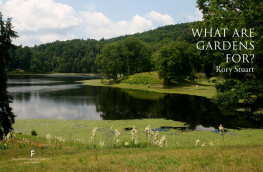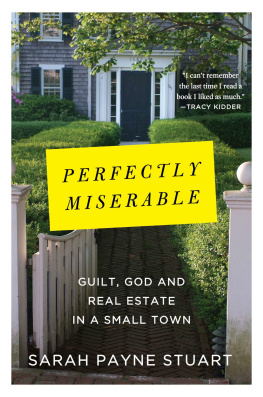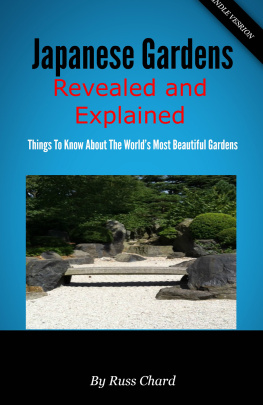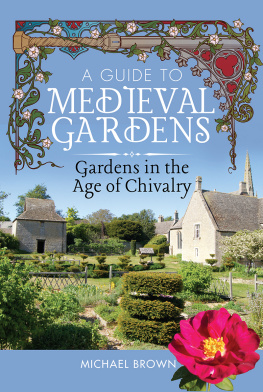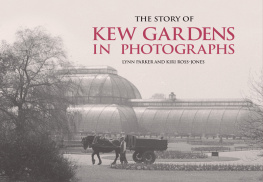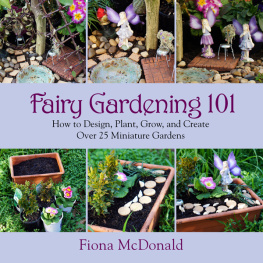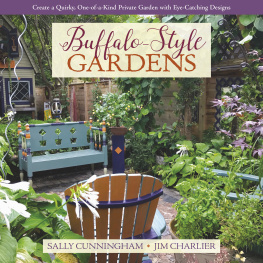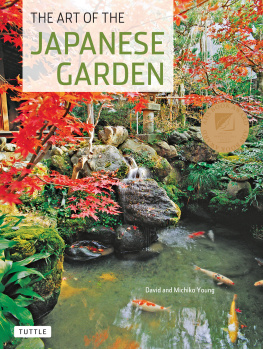WHAT ARE GARDENS FOR?
Rory Stuart

Innisfree, Millbrook, NY, USA
CONTENTS

Such a garden as that of Lante is a world possession, and the builder of it like a great poet who has influenced the life of thousands, putting them in touch with the greatness of the past, lifting their thoughts and aspirations to a higher level, revealing to them the light of their own soul, opening their eyes to the beauty of the world.
Sir George Sitwell, On the Making of Gardens
PREFACE
The subject of this book is the experience we have when we are in a garden. Its purpose is to help both the garden maker and the garden visitor to think harder about what gardens do to them, and can do for them and thus to enjoy them more. If it seems full of repetitions and lacking in direction, that is because it circles this complex subject: thus in exploring how we can understand more fully the pleasures physical, psychological and spiritual that gardens give us I have often approached the same point from a different direction.
There are references to many other arts music, literature, painting because gardens, to be best understood, must be seen in the context of a culture. Gardeners and garden makers do not inhabit, and have never inhabited, a world of their own, cut off from contemporary developments in the other arts, fashion, politics and history. In some traditions, for example the Chinese, the totality of the nations cultural history is of greater importance in making gardens than it is in the West, where a post-romantic emphasis on originality sometimes makes us forget our past, blurs our judgment and undermines the confidence of critics when faced with the very modern. In the conservative world of gardening this is, perhaps, less so than in the other arts, but it does happen.
Permission has been sought from the copyright holders of all the material quoted in this book, but if there are some chance omissions, these will be remedied in subsequent editions. I would like to thank the editors of the International Friends of Ninfa newsletter and of the Garden Design Journal for their permission to reuse material that first appeared in their publications. Thanks, too, to the owners of the Old Vicarage, East Ruston, for permission to use the aerial photograph of their garden. Thanks, again, to Anne Askwith, best of critical readers. And, as always, thanks to the many patient friends who have read parts of this work while it was in preparation, and whose suggestions have made it better than otherwise it would have been. Opinions expressed in this work remain, stubbornly, my own.
WHAT ARE GARDENS FOR?
A garden is a real place imagined, and, with time and care, an imagined place made real.
Patrick Lane
Dean Hole, the celebrated nineteenth-century rosarian, reported a wide variety of answers when he asked the question What are gardens for?. Strawberries, a youngster replies. Those slightly older answer, tennis and garden parties. A horticultural bore opines, A garden is for botanical research and for the classification of plants. A rapturous flapper takes a different tack: What is a garden for? For the soul, sir, for the soul of the poet. For visions of the invisible, for grasping the intangible, for hearing the inaudible, for exaltations... above the miserable dullness of common life into the splendid regions of imagination and romance. The first answers may be succinct to the point of being lapidary, and the last may be breathless gush, but all contain a grain of truth about the universal motives for garden making and for garden visiting. Among other things gardens are for food, fun and fantasizing. Remembering Jane Austens heroines and all those significant walks in the shrubbery, we might extend the alliteration by adding flirtation.
More seriously Professor David E. Cooper in his stimulating and modestly titled A Philosophy of Gardens suggests that gardens may also contribute to what he calls the good life. He argues that many garden practices that is what we do in gardens induce virtues, and that gardens are hospitable to various practices many of which... invite and attract certain virtues by providing especially appropriate opportunities for their exercise. Many of us gardeners think that our gardens add to the quality of our lives, but are we really more virtuous because of our efforts combating the ground elder and pruning the roses? Fortunately Cooper goes on to specify the virtues he means. First, in looking after our plants we are exhibiting, he says, the virtue of care, a virtue that stands close to that of respect for life. And by thus caring for our plants we enhance in ourselves a second virtue, self-discipline, a virtue that imposes a structure and pattern on a life that might otherwise be lacking in shape and unity. Third, when the plant which has been the object of our tender care flowers or fruits, there is the delight in something to which we have contributed but which we could not have achieved alone, and this induces the virtue of humility. This close connection between humus and humility dates back at least to the monastic life of the Middle Ages. And this humility is related to a fourth virtue: that of patient hope, an optimistic expectation that things will turn out well, that the future has positive things to offer. Cooper does not cite the example but surely this is what Arthur Miller is getting at when he makes Willie Loman exclaim, towards the end of Death of a Salesman, Nothings planted. Ive nothing in the ground. Willie feels himself cut off from any optimism about the future, so the plays audience can be little surprised that, shortly thereafter, he decides to kill himself.
Karel apek in The Gardeners Year light-heartedly supports what Cooper has to say about gardeners behaviour. Here is apek on the care of plants during the darkest days of winter: If I knew it would help, I would wrap my holly in my own coat, and draw my pants over the juniper; I would take off my own shirt for you, Azalea pontica; I would cover you with my hat, Alum root, and for you, Coreopsis, nothing is left but my socks. In a humorously exaggerated way he treats the plants like sentient beings just as all gardeners do. Do we not all say of a plant, I dont think its looking very happy today. I must do something for it? Some of us even inquire of the plant, Whats the matter with you? apek also feels the humble sense of grace, of blessedness, when things go well and a plant comes into flower. He feels blessed because so much that made his plant bloom was not in his control, the weather in particular: With everything in the world it is possible to do something, but against weather nothing can be done. No zeal, no ambition, no newfangled methods, no meddling or cursing is of any use; the germ opens and a sprout comes up when it is time, and a law has been accomplished. Here you are humbly conscious of the impotence of man. The virtuous behaviours of feeling humble and grateful, and of putting the needs of other living things above ones own, are all exemplified in apeks book.
Whether or not we feel more virtuous after working in a garden I am not sure, but certainly many of us feel healthier in body and mind after some garden work. It seems that this unselfish caring for our plants induces a mood that is healing, so that gardens provide opportunities both for caring for other lives and for curing ourselves. From my own experience I remember times when knotty problems have resolved themselves during a period of apparently mindless garden work hand weeding, raking leaves or sawing logs. It is as though the job in hand requires just enough conscious attention to allow the unconscious mind to work out a solution to the gnawing problem, rather as in half-sleep a writer finds just the phrase for which his or her anxious, conscious mind had been searching all day; too often anxiety prevents the solution from becoming apparent. In discussing how a poem communicates with its reader, T.S. Eliot talked of a poems meaning being like the drugged meat the burglar throws to the guard dog: the meaning occupies the conscious intellect while the poem goes to work on the reader at a subtler level. Garden work has the same effect; monotonous activity in agreeable surroundings distracts the conscious mind, particularly when burdened with worry or tension, so that the unconscious mind can do its solving work.
Next page
